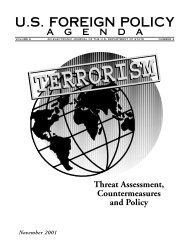Working for Women Worldwide - Embassy of the United States
Working for Women Worldwide - Embassy of the United States
Working for Women Worldwide - Embassy of the United States
Create successful ePaper yourself
Turn your PDF publications into a flip-book with our unique Google optimized e-Paper software.
and assistance <strong>for</strong> victims, bilateral assistance <strong>for</strong><br />
countries fighting trafficking, a penalty <strong>of</strong> up to 20<br />
years in prison <strong>for</strong> Americans involved in human trafficking,<br />
and a mandate <strong>for</strong> <strong>the</strong> Department <strong>of</strong> State to<br />
issue an annual global report on <strong>the</strong> problem.<br />
Trafficking: The International Ef<strong>for</strong>t<br />
The <strong>United</strong> <strong>States</strong> is confronting nations that<br />
pr<strong>of</strong>it from or tolerate human trafficking. Those countries<br />
face possible sanctions that include <strong>the</strong> loss <strong>of</strong> U.S.<br />
military and economic assistance and U.S. support at<br />
<strong>the</strong> World Bank and <strong>the</strong> International Monetary<br />
Fund. This approach and <strong>the</strong> State Department’s<br />
annual listing <strong>of</strong> countries<br />
in its Trafficking in Persons<br />
Report have helped heighten<br />
international awareness<br />
<strong>of</strong> human trafficking.<br />
The U.S. report is a<br />
diplomatic tool, encouraging<br />
governments around<br />
<strong>the</strong> world to cooperate in<br />
<strong>the</strong> global ef<strong>for</strong>t to end<br />
trafficking in persons.<br />
The 2004 report looks at<br />
140 countries that have<br />
significant numbers <strong>of</strong><br />
victims <strong>of</strong> severe <strong>for</strong>ms <strong>of</strong><br />
trafficking. Countries are<br />
rated according to <strong>the</strong>ir ef<strong>for</strong>ts to eliminate trafficking<br />
in persons.<br />
Tier 1 countries are those that comply with <strong>the</strong><br />
TVPA’s minimum standards <strong>for</strong> <strong>the</strong> elimination <strong>of</strong><br />
trafficking. Tier 2 countries do not yet fully comply<br />
with <strong>the</strong>se standards, but <strong>the</strong>y have been making significant<br />
ef<strong>for</strong>ts to do so. Tier 2 Watch List countries<br />
require special scrutiny because <strong>the</strong>y have a high number<br />
<strong>of</strong> victims or have failed to provide sufficient evidence<br />
<strong>of</strong> <strong>the</strong>ir ef<strong>for</strong>ts to combat trafficking. Tier 3<br />
countries do not satisfy <strong>the</strong> minimum standards <strong>of</strong> <strong>the</strong><br />
TVPA or show any ef<strong>for</strong>t to do so.<br />
A Tier 3 assessment can result in <strong>the</strong> withholding<br />
<strong>of</strong> U.S. nonhumanitarian, nontrade-related assistance<br />
to those countries. Countries listed on Tier 3 can avoid<br />
sanctions by taking swift action within three months<br />
<strong>of</strong> <strong>the</strong> report’s release.<br />
Bangladesh was one <strong>of</strong> <strong>the</strong> countries that did just<br />
that. Within 90 days <strong>of</strong> <strong>the</strong> release <strong>of</strong> <strong>the</strong> 2004 report,<br />
its government substantially increased anti-trafficking<br />
activities. It opened an <strong>of</strong>fice on trafficking in persons.<br />
It completed 17 trafficking-related cases, resulting in<br />
30 convictions. It launched a number <strong>of</strong> law en<strong>for</strong>cement<br />
operations against suspected traffickers, leading<br />
to <strong>the</strong> arrest <strong>of</strong> 47 persons and <strong>the</strong> rescue <strong>of</strong> 102 victims.<br />
As a result <strong>of</strong> its ef<strong>for</strong>ts, Bangladesh was moved<br />
from Tier 3 onto <strong>the</strong> Tier 2 Watch List.<br />
Through <strong>the</strong> Department <strong>of</strong> State, U.S. assistance<br />
goes to NGOs also combating trafficking. The<br />
Angel Coalition, one <strong>of</strong> <strong>the</strong> groups funded by <strong>the</strong><br />
department, assists NGOs in Russia and is building<br />
an international hotline to improve investigation <strong>of</strong><br />
trafficking rings that will lead to more convictions in<br />
court. Grants from <strong>the</strong> U.S. Agency <strong>for</strong> International<br />
Development (USAID)<br />
go to NGOs such as <strong>the</strong><br />
International Justice Mission,<br />
a faith-based organization<br />
fighting trafficking<br />
in Cambodia.<br />
The <strong>United</strong> <strong>States</strong><br />
works through international<br />
organizations, too,<br />
to fight trafficking in persons.<br />
This includes promoting<br />
and supporting<br />
resolutions in various<br />
U.N. <strong>for</strong>ums, and providing<br />
voluntary contributions<br />
to U.N. bodies that<br />
assist victims <strong>of</strong> trafficking and countries that suppress<br />
trafficking. For example, U.S. contributions enable <strong>the</strong><br />
U.N. to translate and distribute public service antitrafficking<br />
announcements in Chinese, French,<br />
German, Hausa, Portuguese, Russian, Spanish, and<br />
Swahili. U.S. funds also were used to help establish a<br />
center in Indonesia where victims receive medical,<br />
legal, and psychological care be<strong>for</strong>e returning home.<br />
To bring greater international attention to <strong>the</strong><br />
problem <strong>of</strong> a growing demand <strong>for</strong> child prostitutes,<br />
and to stimulate <strong>for</strong>eign government action, <strong>the</strong><br />
<strong>United</strong> <strong>States</strong> cohosted a luncheon panel discussion<br />
in New York with World Vision and pop singer Ricky<br />
Martin in 2004. At <strong>the</strong> event, Martin spoke eloquently<br />
about <strong>the</strong> work <strong>of</strong> his foundation and <strong>the</strong><br />
This page, sex workers at a bar in <strong>the</strong> lakeside resort <strong>of</strong> Ohrid, Macedonia,<br />
after a raid by police to discourage trafficking. Facing page, Muna<br />
Magar, once one <strong>of</strong> thousands <strong>of</strong> Nepali girls trafficked into India to<br />
work as prostitutes. After escaping this life, she works at <strong>the</strong> Nepal-<br />
India border, checking every vehicle <strong>for</strong> illegal trafficking activity.<br />
52












